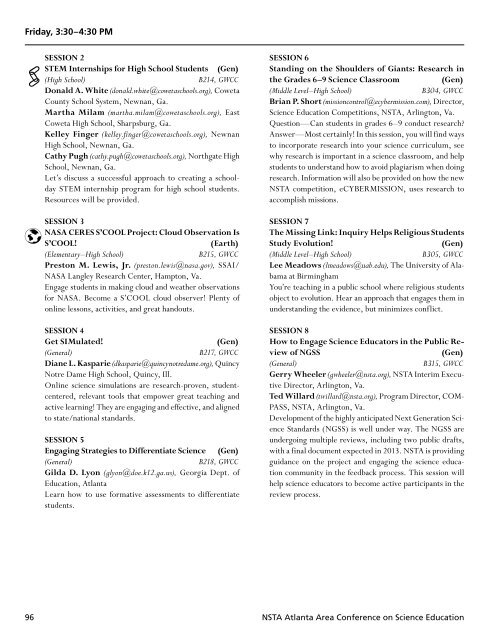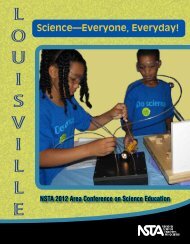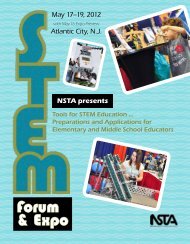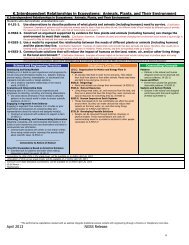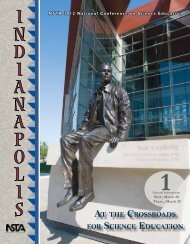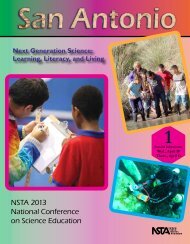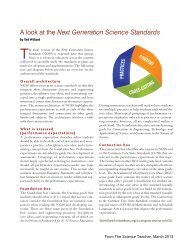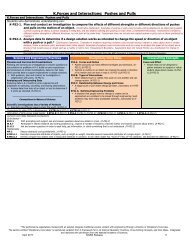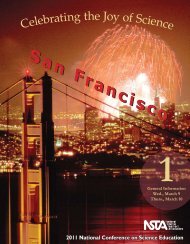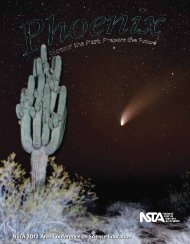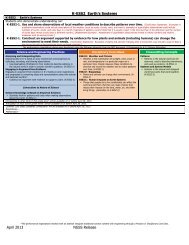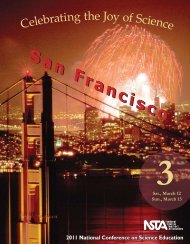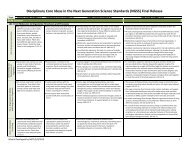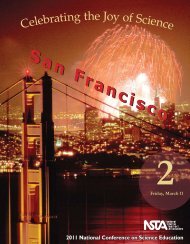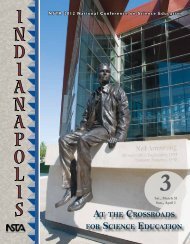Atlanta Conference Program
Atlanta Conference Program
Atlanta Conference Program
You also want an ePaper? Increase the reach of your titles
YUMPU automatically turns print PDFs into web optimized ePapers that Google loves.
Friday, 3:30–4:30 PM<br />
'<br />
p<br />
SESSION 2<br />
STEM Internships for High School Students (Gen)<br />
(High School)<br />
B214, GWCC<br />
Donald A. White (donald.white@cowetaschools.org), Coweta<br />
County School System, Newnan, Ga.<br />
Martha Milam (martha.milam@cowetaschools.org), East<br />
Coweta High School, Sharpsburg, Ga.<br />
Kelley Finger (kelley.finger@cowetaschools.org), Newnan<br />
High School, Newnan, Ga.<br />
Cathy Pugh (cathy.pugh@cowetaschools.org), Northgate High<br />
School, Newnan, Ga.<br />
Let’s discuss a successful approach to creating a schoolday<br />
STEM internship program for high school students.<br />
Resources will be provided.<br />
SESSION 3<br />
NASA CERES S’COOL Project: Cloud Observation Is<br />
S’COOL!<br />
(Earth)<br />
(Elementary–High School)<br />
B215, GWCC<br />
Preston M. Lewis, Jr. (preston.lewis@nasa.gov), SSAI/<br />
NASA Langley Research Center, Hampton, Va.<br />
Engage students in making cloud and weather observations<br />
for NASA. Become a S’COOL cloud observer! Plenty of<br />
online lessons, activities, and great handouts.<br />
SESSION 4<br />
Get SIMulated!<br />
(Gen)<br />
(General)<br />
B217, GWCC<br />
Diane L. Kasparie (dkasparie@quincynotredame.org), Quincy<br />
Notre Dame High School, Quincy, Ill.<br />
Online science simulations are research-proven, studentcentered,<br />
relevant tools that empower great teaching and<br />
active learning! They are engaging and effective, and aligned<br />
to state/national standards.<br />
SESSION 5<br />
Engaging Strategies to Differentiate Science (Gen)<br />
(General)<br />
B218, GWCC<br />
Gilda D. Lyon (glyon@doe.k12.ga.us), Georgia Dept. of<br />
Education, <strong>Atlanta</strong><br />
Learn how to use formative assessments to differentiate<br />
students.<br />
SESSION 6<br />
Standing on the Shoulders of Giants: Research in<br />
the Grades 6–9 Science Classroom<br />
(Gen)<br />
(Middle Level–High School)<br />
B304, GWCC<br />
Brian P. Short (missioncontrol@ecybermission.com), Director,<br />
Science Education Competitions, NSTA, Arlington, Va.<br />
Question—Can students in grades 6–9 conduct research<br />
Answer—Most certainly! In this session, you will find ways<br />
to incorporate research into your science curriculum, see<br />
why research is important in a science classroom, and help<br />
students to understand how to avoid plagiarism when doing<br />
research. Information will also be provided on how the new<br />
NSTA competition, eCYBERMISSION, uses research to<br />
accomplish missions.<br />
SESSION 7<br />
The Missing Link: Inquiry Helps Religious Students<br />
Study Evolution!<br />
(Gen)<br />
(Middle Level–High School)<br />
B305, GWCC<br />
Lee Meadows (lmeadows@uab.edu), The University of Alabama<br />
at Birmingham<br />
You’re teaching in a public school where religious students<br />
object to evolution. Hear an approach that engages them in<br />
understanding the evidence, but minimizes conflict.<br />
SESSION 8<br />
How to Engage Science Educators in the Public Review<br />
of NGSS<br />
(Gen)<br />
(General)<br />
B315, GWCC<br />
Gerry Wheeler (gwheeler@nsta.org), NSTA Interim Executive<br />
Director, Arlington, Va.<br />
Ted Willard (twillard@nsta.org), <strong>Program</strong> Director, COM-<br />
PASS, NSTA, Arlington, Va.<br />
Development of the highly anticipated Next Generation Science<br />
Standards (NGSS) is well under way. The NGSS are<br />
undergoing multiple reviews, including two public drafts,<br />
with a final document expected in 2013. NSTA is providing<br />
guidance on the project and engaging the science education<br />
community in the feedback process. This session will<br />
help science educators to become active participants in the<br />
review process.<br />
96 NSTA <strong>Atlanta</strong> Area <strong>Conference</strong> on Science Education


